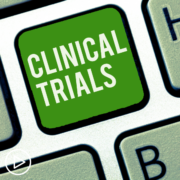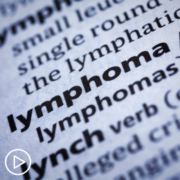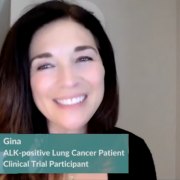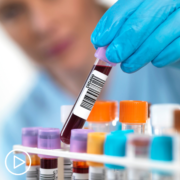Advances in Targeted Lung Cancer Treatments | What You Should Know
Advances in Targeted Lung Cancer Treatments | What You Should Know from Patient Empowerment Network on Vimeo.
Dr. Thomas Marron discusses how these therapies work to treat lung cancer, how the presence of certain mutations can impact care and treatment choices, and the research being done on new therapies to target specific lung cancer biomarkers.
Dr. Thomas Marron is Director of the Early Phase Trials Unit at the Tisch Cancer Institute at Mount Sinai Hospital. Dr. Marron is also Professor of Medicine and Professor of Immunology and Immunotherapy at the Icahn School of Medicine at Mount Sinai. Learn more about Dr. Marron.
See More from EVOLVE Lung Cancer
Related Resources:

|
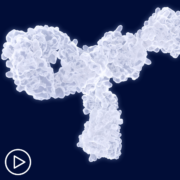
Antibody Drug Conjugates for Lung Cancer | Advances in Research |

Expert Perspective | New and Emerging Progress in Lung Cancer Treatment |
Transcript:
Katherine Banwell:
Welcome, Dr. Marron. Would you introduce yourself, please?
Dr. Thomas Marron:
Sure, I’m Tom Marron. I’m the Director of the Early Phase Trials Unit at the Tisch Cancer Institute at Mount Sinai Hospital. I’m a Professor of Medicine and also a Professor of Immunology and Immunotherapy at the Icahn School of Medicine at Mount Sinai. And I’m trained as both an oncologist and an immunologist.
Katherine Banwell:
Excellent. Thanks for joining us today.
Dr. Thomas Marron:
Thank you for having me.
Katherine Banwell:
We know that the presence of certain mutations can affect lung cancer treatment options. Can you share the latest updates in targeted therapies?
Dr. Thomas Marron:
Sure, so there’s been a lot of developments in targeted therapies as of late.
Mutations in a patient’s cancer can represent a potential therapeutic target, and we have increasing numbers, every year we have new FDA approvals for typically pills that target very specific mutations and are able to either control cancer or even kill cancer. Additionally, we use DNA sequencing of tumors to identify mutations that could be predictive of a response to certain therapies. So, even though we don’t have a specific drug to target that mutation in their DNA, that change in their DNA that’s making the cancer grow, we do know that patients with certain DNA mutations do better on certain therapies than other therapies.
And so, we can use mutations specifically to help guide therapy, even if we don’t have a targeted therapy for something like EGFR mutation or a KRAS mutation. And additionally, one of the things that we do as we’re treating patients is, often times we will give a patient with lung cancer a therapy and then their cancer may respond for weeks, months, even years.
But then it might recur, or it might just start growing if it never went away entirely. And at that time, we’re oftentimes repeating the genetic sequencing, whether doing a biopsy or sometimes we can do what we call a liquid biopsy, which is just taking some blood and looking for some of the DNA from the cancer floating around in the blood.
And the reason we do that is that if you see a change in the mutations, it might represent either a change in the type of cancer or it might represent what we call an escape mutation, or an escape mechanism where the cancer that had been responding to therapy X is now not responding because it changed its DNA to overcome the therapy you were given. And that might suggest that we try a specific new therapy, or that we just change our approach entirely.
Katherine Banwell:
You’ve answered my next question to some degree, but I’m going to ask it anyway. How do these therapies work to treat lung cancer?
Dr. Thomas Marron:
So, cancer is caused by changes in your DNA. So, your DNA is your instruction booklet on how cells should grow and when they should grow. And every cell in your body theoretically has the same DNA, except for, because of a variety of things like smoking or exposure to radon or just living in a large city full of pollution. As we get older, we basically accrue more and more mutations and changes in our DNA, our instruction booklet. And while most of these changes really don’t have any sequela, and they’re not going to affect the ability for the cancer, or for normal cells to grow.
Sometimes you’ll get a mutation in a very specific gene that’s important for telling cells when to divide and when to grow and when not to grow. And you can think of it as a light switch where the light switch gets stuck in the on position and constantly, cells are growing and growing and growing and that’s when you have cancer. So, when you have these mutations, one of the approaches that we’ve been working on for the last few decades, in particular in the last few years.
We have lots of these new drugs that target these mutations, and they basically turn that on signal off. So, they disrupt, it’s like turning the light switch off. You’re disrupting the constant grow, grow, grow signal and keeping the cancer from growing. Typically, we think of these targeted therapies that do this, not as cures for cancer, at least when patients have metastatic disease, but they’re very good at controlling cancer. And some of these therapies can work for years, even a decade and control the cancer. But often times, unfortunately cancer always finds a way to outsmart us, even when we’re outsmarting it.
Katherine Banwell:
Right. Are there new mutations being discovered that can impact the future of small cell lung cancer care?
Dr. Thomas Marron:
Well, I’m not sure I would say that there’s a lot of new mutations that’ve been discovered, per se. Every time that you come in and get a diagnosis of lung cancer, we typically will take the tissue and like I said, sometimes we’ll take some blood and do a liquid biopsy and look for a slew of different known mutations.
And typically, we’ll look for anywhere from three to 500 known mutations in the cancer, even though we only have drugs to treat about 10 of those three to 500. The nice thing though is that as we learn more and more and more about these mutations and we study them, we are developing more and more drugs to address specific mutations. So, five years ago we really only had three different mutations that we could target.
Now, we have around 10 because we have all these new drugs that target very specific mutations whether they be in genes like MET or RET or KRAS or BRAS.
So, I think that while we aren’t necessarily discovering that many new genes, we’ve been looking at the genetic sequence of cancer and also, just the human genome for 20 to 30 years at this point, we’re discovering lots of new drugs that can target those specific mutations that we know patients have, but that most of the mutations we identify are not necessarily druggable targets.


